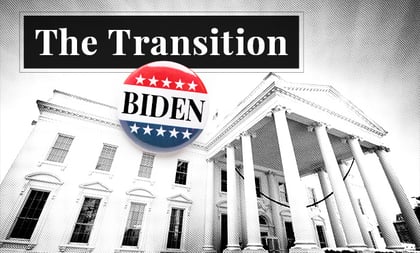 Photo: Ryan Rodrick Beiler/Shutterstock
Photo: Ryan Rodrick Beiler/Shutterstock
President-elect Joe Biden and Vice President-elect Kamala Harris wasted little time in early November assembling their transition teams.
Some familiar faces — such as Gary Gensler, former head of the Commodity Futures Trading Commission and Dennis Kelleher, president and CEO of Better Markets — are part of the agency review team responsible for the Federal Reserve as well as the Securities and Exchange Commission and Consumer Financial Protection Bureau.
Agency review team members are responsible for “understanding the operations of each agency, ensuring a smooth transfer of power, and preparing for President-elect Biden and Vice President-elect Harris and their cabinet to hit the ground running on day one,” explains the Biden-Harris transition website.
Gensler and Kelleher are both staunch fiduciary advocates. Gensler is also chairman of the Maryland Financial Consumer Protection Commission, which recommended pursuing a state fiduciary law. The Institute for the Fiduciary Standard awarded Gensler with the 2014 Tamar Frankel Fiduciary Prize.
Kelleher of Better Markets, an advocacy group that supports financial regulation, has been a staunch opponent of the Securities and Exchange Commission’s Regulation Best Interest.
Kelleher said during a Sept. 15 webcast, dubbed “President Trump’s Deregulation of Wall Street Making Catastrophe More Likely,” that the SEC has left investors behind “over the last three years as it protects industry profits first.
You can see that in the refusal to enact the uniform fiduciary duty rule so that brokers are required to always put their clients’ interest first regarding their clients’ own money.”
Reg BI was one of 65 final rules that SEC Chairman Jay Clayton advanced to date from the commission’s policy divisions and offices. Clayton announced in mid-November that he’d be stepping down from the agency by year-end.
Names being floated to replace Clayton in the new administration include Gensler, who also was former co-head of Finance for Goldman Sachs, and Preet Bharara, the U.S. attorney for the Southern District of New York under former President Barack Obama.
The Labor Department sent its fiduciary prohibited transaction exemption to align with Reg BI, dubbed Improving Investment Advice for Workers & Retirees Exemption, was sent to the Office of Management and Budget for review on Nov. 25.
Brad Campbell, partner at Faegre Drinker in Washington and former head of Labor’s Employee Benefits Security Administration, said during a Nov. 5 webcast that Labor’s fiduciary rule to align with Reg BI could be “a dead letter” if Labor failed to send is final version to OMB by mid-November.
If Trump published a final rule before Nov. 20 — 60 days before the end of his term — the Biden administration “typically would have to use notice and comment rulemaking to suspend or modify that regulation,” which is a time-consuming process, Campbell said.
If Trump puts a rule on the books less than 60 days before leaving office, President Biden could squash it “basically with a stroke of a pen,” Campbell added.
The Trump fiduciary rule remains up in the air.
With no “second term of the Trump administration, it’s quite likely that the DOL fiduciary rule, as the Trump administration envisions, is a dead letter.”
That doesn’t mean the fiduciary rule issue is dead.
In fact, with “a Biden administration, we think it’s very likely that they will pursue, again, a fiduciary regulation which likely would be a combination of actually changing the 1975 regulation in material ways — bearing in mind the objections of the 5th Circuit [Court of Appeals], which struck down the Obama-era” fiduciary rule, the attorney explained.









 December 17, 2020 at 01:16 PM
December 17, 2020 at 01:16 PM











